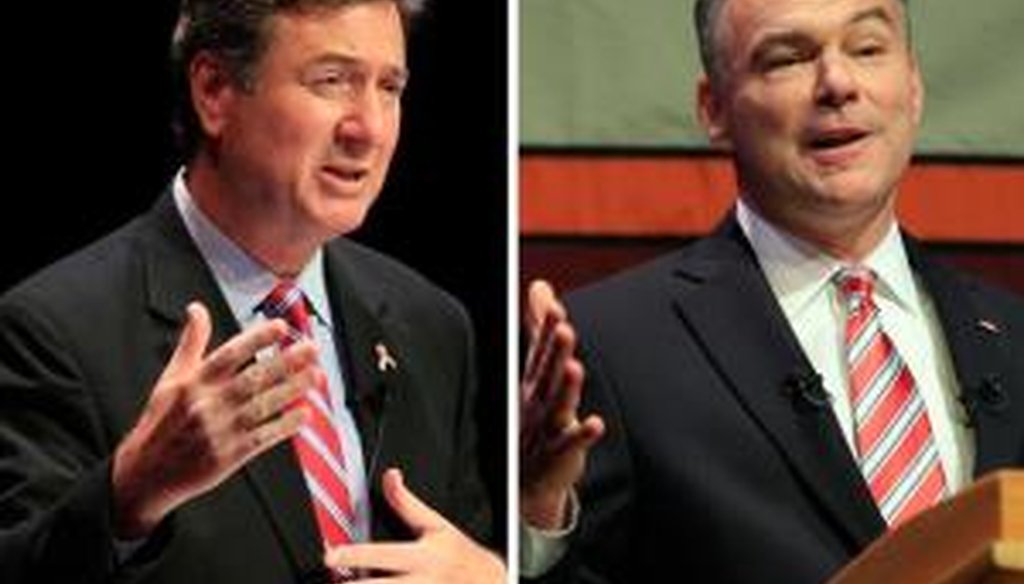Stand up for the facts!
Our only agenda is to publish the truth so you can be an informed participant in democracy.
We need your help.
I would like to contribute

Republican George Allen, left, and Democrat Tim Kaine have voiced little agreement on tax and spend issues.
One thing Virginia’s candidates for the U.S. Senate agree on is that federal borrowing must go down. But Republican George Allen and Democrat Tim Kaine are at sharp odds on how the nation should move towards balancing its budget -- something that hasn’t happened since 2001.
The U.S. government ran a $1.1 trillion deficit for the fiscal year that ended on Sept. 30 -- the fourth straight year the nation wound up more than $1 trillion in the red.
Allen says deficits should be lowered entirely by cutting spending. He has signed a pledge not to raise taxes that was drafted by the Americans for Tax Reform, a conservative group headed by Grover Norquist.
In a July 21 debate, Allen said he would reject tax increases even if they were included in a bill with spending cuts 10 times greater in size. "My perspective is that raising taxes will only create more job losses," he said.
Kaine says efforts to address the nation’s fiscal imbalance should include additional tax revenues as well as spending cuts. In an Oct. 20 debate, Kaine voiced general support for a plan that would make "two or three dollars of cuts for every dollar of revenue."
The time for hard decisions is at hand as the nation speeds towards a fiscal cliff. Without congressional intervention, tax cuts passed in 2001 and 2003 under then-President George W. Bush will expire at the end of this year. And if Congress doesn’t strike a deficit reduction deal, $1 trillion in automatic cuts -- split evenly between defense and domestic programs over 10 years -- will be triggered Jan. 2.
How would Allen and Kaine deal these economic issues? Let’s take a close look at their proposals.
The Allen plan
*Allen opposes any tax increases. To that end, he supports making the Bush-era tax cuts permanent. The price tag for extending the cuts over 10 years is $4.5 trillion, according to the Congressional Budget Office.
*Allen wants to cut the corporate tax rate from 35 percent to 20 percent. Allen says the current rate -- among the highest in the world -- discourages corporate hiring and investment. In exchange for lowering the rate, Allen says he would be willing to close some corporate tax loopholes but hasn’t identified which ones. There is no cost estimate for Allen’s plan.
*Allen wants to eliminate the estate or "death tax." The CBO estimates the estate and gift taxes will bring in $536 billion over the next 10 years, most of which is in estate taxes.
*Allen has endorsed, in concept, a voluntary flat federal income tax for individuals and couples who don’t want the burden of filing complicated returns. He has offered few details on how the plan would work and has not proposed a flat tax rate.
*Allen says popular tax breaks, such as the deduction on mortgage interest, should remain intact for those who itemize their tax returns. He says many people have based long-term financial decisions, such as buying a house, on the availability of tax deductions.
*Allen says holding the line on some taxes and lowering others will give corporations and small business owners confidence to hire more people and thereby broaden the tax base.
*Allen’s key cost-cutting proposal is the repeal of Obamacare, which he says would save $1 trillion over 10 years. The non-partisan CBO projected in July that ending Obamacare would increase deficits by $109 billion over 10 years because tax revenues and medical efficiencies generated under the law would be lost.
*Allen says expanding domestic production of offshore oil and natural gas production could generate $2.1 trillion in revenues over 30 years. The estimate comes from a 2009 report by the American Energy Alliance, an advocacy group that is associated with the oil industry.
*Allen signed in 2011 the pledge to support the "cut, cap and balance" bill, which passed the House and died in the Senate. The measure called for $10 billion in immediate, unspecified budget cuts, a Balanced Budget Amendment, supermajority vote to raise taxes and a cap that would limit federal spending to 20 percent of the Gross Domestic Product by 2017. This fiscal year, federal spending will total about $3.8 trillion, or 24.3 percent of the nation’s $15.6 trillion GDP. Setting the cap at 20 percent would be the equivalent of setting current spending at $3.12 trillion -- a $580 billion cut. As a comparison, total for defense is projected at $702 billion this year and Medicare is budgeted at $530 billion.
*Allen supports gradually increasing the age of eligibility for Medicare and reducing benefits for the wealthy, but has not offered specifics. He says benefits should not change for those who are now 50 or older. Allen also says the government could generate savings by cracking down on Medicare fraud, which has been estimated at $48 billion a year by the General Accounting Office.
*Allen urges several government housekeeping changes to save money. He says members of Congress should not be paid when there is a government shutdown and earmarks -- or pork barrel projects -- should be banned until the federal budget is balanced.
*Allen opposed a last-minute congressional deal in 2011 that raised the nation’s borrowing limit and may trigger the $1 trillion automatic spending cuts next year. He vehemently opposes the $500 billion in defense cuts over 10 years that would be set in motion.
The Kaine plan
*Kaine wants to end the Bush era tax cuts for individuals and couples with annual adjusted gross income of $500,000 or more and keep the reductions for everyone else. Over 10 years, the plan would lop off $566 billion from the cost of extending all the tax cuts, according to the Congressional Research Service.
*Kaine praises the concept of a 2010 plan by the bipartisan Simpson-Bowles Commission that calls for cutting deficits by $4 trillion by 2020 through spending cuts and $1.1 trillion in new tax revenues. But he says he would not vote for the plan in its current form because he does not agree with its proposals to raise gas taxes and reform Social Security.
*Kaine says revenues can be gained by broadening the tax base -- an approach that lowers tax rates but eliminates many tax deductions. He has not offered many specifics on this front. He says Congress -- rather than entering an explosive debate on whether to curtail popular tax breaks on mortgage interest and charitable contributions -- should set overall dollar limits for the amount deductions people could claim.
*Kaine says he "would be open" to establishing a minimum federal income tax for all Americans with earnings. Forty-seven percent of Americans pay no federal income taxes, although they do pay other levies such as payroll, state income and sales taxes.
*Kaine says Medicare should be allowed to negotiate prescription drug prices with pharmaceutical companies -- a reform that he has said could save up to $240 billion over a decade based on an optimistic estimate from the National Committee to Preserve Social Security and Medicare. The White House has projected the savings at $156 billion over 10 years.
*Kaine calls for ending tax breaks and subsidies to the "Big Five" oil companies, an action that White House estimates would save $24 billion over five years.
*Kaine says the Congress should lower spending through "targeted cuts" as opposed to across-the-board reductions. He hasn’t offered many details on what those targets should be, other than to suggest savings could be found in closing some overseas military bases.
*Kaine supported the 2011 deal that raised the nation’s borrowing limit, saying it prevented the U.S. from defaulting on it obligations. He has voiced hope that Congress can reach a debt reduction compromise -- incorporating spending cuts and tax increases -- and avoid the automatic reductions to defense and domestic programs scheduled to kick in Jan. 2.
The bottom line
Allen would reduce deficits by cutting taxes and spending. His plan is based on a philosophy that low levies will encourage corporations and small businesses to expand and create jobs, thereby broadening tax revenues.
Allen proposes permanently extending all of the Bush tax cuts, reducing rates on corporations, ending the inheritance tax and retaining popular deductions for people who itemize their returns. He has signed a pledge not to vote for any tax increases.
On the spending side, Allen condemns $500 billion in automatic defense cuts scheduled to begin Jan. 2. That suggests he would turn to domestic programs for deep cuts. He says Social Security and Medicare are in need of reform.
Kaine says deficits must be lowered by a blend of spending cuts and tax increases. He avoids specifics and ultimatums, saying he wants to be in a position to promote bipartisan compromise.
The Democrat wants to eliminate the Bush tax cuts for those earning $500,000 or more in adjusted gross income. He wants to end tax breaks for big oil companies and says Medicare should be allowed to negotiate prescription drug prices. The three reforms would save about $750 billion over 10 years.
Beyond that, Kaine talks broadly about reining in tax exemptions and looking for savings in defense as well as domestic programs.
Our Sources
Congressional Budget Office, "Monthly Budget Review," Oct. 5, 2102.
White House, "Summary of receipts, outlays, surpluses or deficits: 1789-2017," accessed Nov. 1, 2012.
Americans for Tax Reform, "List of election 2012 taxpayer protection signers," accessed Oct. 23, 2012.
Congressional Budget Office, "An Update to the Budget and Economic Outlook: Fiscal Years 2012-2022," page 19, August 2012.
PolitiFact Virginia, "George Allen says Tim Kaine has ‘doubled down’ in his support of defense cuts," Sept. 20, 2012.
PolitiFact Virginia, "George Allen says ending Obamacare would save nation $1 trillion," Oct. 11, 2012.
PolitiFact Virginia, "Tim Kaine says George Allen’s flat tax ‘plan’ shrinks revenues more than Rick Perry’s proposal," Nov. 14, 2011.
PolitiFact Virginia, "George Allen says U.S. corporate tax rate is second-highest in world," June 18, 2012.
PolitiFact Virginia, "George Allen says U.S. leads world in energy resources," June 17, 2011.
PolitiFact Virginia, "George Allen says the health care bill defies the wishes of Americans," April 4, 2011.
George Allen,"George Allen statement on Washington’s debt ceiling deal," Aug. 1, 2011.
Cut Cap and Balance Act.com, "The Cut, Cap and Balance Act of 2011," accessed Sept. 13, 2012.
YouTube.com, "Fairfax Chamber of Commerce/NBC 4 Debate," (Allen’s answer on tax code begins at 21:30) Sept. 20, 2012.
White House, "Summary of receipts, outlays, surpluses and deficits as percentages of GDP,"
accessed Oct. 31, 2012.
White House, "Outlays by superfunction and function: 1940-2017," accessed Oct. 31, 2012.
Congressional Budget Office, "Estimate for the Insurance Coverage Provisions of the Affordable Care Act Updated for the Recent Supreme Court Decision," July 24, 2012.
Congressional Budget Office, "Tax Receipts spreadsheet from An Update to the Budget and Economic Outlook: Fiscal Years 2012 to 2022," Aug. 22, 2012.
Congressional Budget Office, "Baseline Economic Forecast spreadsheet from An Update to the Budget and Economic Outlook: Fiscal Years 2012 to 2022," Aug. 22, 2012.
George Allen, "Blueprint for America," Part 1,Part 2,Part 3, June 2011.
Senate debate, Allen answers revenue question at 23:30, Oct. 18, 2012.
House Committee on Natural Resources,Testimony of Dr. Joseph R. Mason, professor of finance at Louisiana State University, April 6, 2011.
U.S. Government Accountability Office, Statement of Kathleen King, director of health care, March 2, 2011.
Congressional Research Service,"The 2001 and 2003 Bush tax cuts and deficit reduction," July 18, 2012.
Interview with Roberton Williams, senior fellow at the Tax Policy Center, Nov. 2, 2012.
Kaine for Virginia, "Kaine statement on debt ceiling compromise," Aug. 1, 2011.
PolitiFact Virginia, "George Allen says Tim Kaine ‘announced he wants to raise taxes on everyone,’", Sept. 24, 2012.
YouTube, "Tim Kaine Open To Minimum Income Tax For the 47 Percent," (Video) Sept. 20, 2012.
National Committee to Preserve Social Security and Medicare, "Price Negotiation for the Medicare Drug Program: It’s Time to Lower Costs for Seniors," October 2009.
U.S. Department of Health and Human Services, "Fiscal year 2013 budget in brief," page 57, accessed Nov. 1, 2012
Kaine for Virginia, "Kaine statement on debt ceiling compromise,"August 1, 2011.
The National Commission on Fiscal Responsibility "The Moment of Truth,"December 2010.
Washington Post "A few misconceptions about Simpson-Bowles,"Oct. 2, 2012.
Kaine for Virginia, "Kaine, Warner discuss plan to avoid sequestration with defense contractors in Ashburn," September 18, 2012.
Kaine for Virginia,"Fiscal responsibility," accessed October 29, 2012.


















































